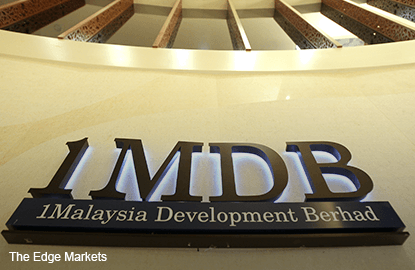
This article first appeared in Corporate, The Edge Malaysia Weekly, on April 18 - 24, 2016.

1MALAYSIA Development Bhd (1MDB) last week found itself at odds with one of its biggest financial counterparties — Abu Dhabi’s International Petroleum Investment Company (IPIC) — which could put the final piece of its debt rationalisation plan in jeopardy.
Based on IPIC’s financial statements dated June 30, 2015, 1MDB is estimated to owe the former about US$1.58 billion. On top of that, 1MDB was counting on IPIC to assume US$3.5 billion worth of bonds, in exchange for assets, as part of the rationalisation plan announced by president and group executive director Arul Kanda Kandasamy last June.
In fact, IPIC has been servicing 1MDB’s debts pertaining to the US$3.5 billion worth of bonds, effectively keeping 1MDB liquid in the short term while the rationalisation plan is undertaken.
But can IPIC continue to deal with 1MDB in light of last week’s developments?
1MDB did not respond to The Edge’s questions about what will happen from here on.
IPIC and its subsidiary, Aabar Investments PJS (Aabar), last week claimed that neither had received US$3.5 billion in payments from 1MDB. Instead, the payments were made to a British Virgin Island-registered doppelganger with a similar name, Aabar Investments PJS Ltd (Aabar BVI), which has no connection to IPIC.
1MDB’s transfers to Aabar BVI included US$1.4 billion in deposits for co-guaranteeing the US$3.5 billion bonds raised to buy two power plant companies in 2012. The transfers also include payments of US$855 million, US$993 million and US$295 million as security deposits and other guarantees for the bonds.
IPIC and Aabar’s statements were tantamount to alleging outright embezzlement of billions of dollars that belonged to 1MDB.
However, 1MDB responded immediately to the statements, pointing out that it had dealt with IPIC executives — IPIC managing director Khadem Al Qubaisi and Aabar CEO Mohamed Badawy Al Husseiny.
Arul Kanda is now claiming that 1MDB may have been a victim of fraud from its dealings with IPIC.
Both Khadem and Badawy left IPIC in 2015, and have since been arrested by the Abu Dhabi authorities. Their arrests were made before IPIC’s announcement.
Khadem and Badawy were the executives with IPIC and Aabar respectively when 1MDB began transacting with the companies back in 2012.
1MDB may have over US$5 billion at stake if relations with IPIC sour.
By June 30, 2016, the two parties were supposed to complete the debt for asset swap. The deal would have seen IPIC assume the entire US$3.5 billion bond liability from 1MDB, in exchange for assets. The said assets are the so-called “available for sale assets” sitting in 1MDB’s books that are of questionable valuation.
These are the same US$3.5 billion bonds arranged by Goldman Sachs back in 2012, which are co-guaranteed by IPIC.
Back then, 1MDB had virtually no equity or operating businesses to support the bond issuance. It needed a boost to its credit rating and found IPIC to step in as a co-guarantor.
In a back-to-back deal, IPIC secured the rights to acquire up to 49% of 1MDB’s power assets at a fixed price — Powertek Investment Holdings Sdn Bhd and 1MDB Energy (Langat) Sdn Bhd. Note that that there is no mention of any deposit given by 1MDB to Aabar in the latter’s financial statements.
In 2014, as 1MDB pursued the listing of its power assets, it opted to extinguish the options by paying IPIC off. This is noted in IPIC’s financial statements but as at June 30, 2015, IPIC’s financials noted that US$481.33 million were still outstanding from 1MDB.
On June 4, 2015, as part of a binding term sheet signed with 1MDB and Malaysia’s Minister of Finance Inc (MoF Inc), IPIC would go on to “provide US$1 billion to 1MDB for 1MDB to utilise immediately to settle certain of its liabilities”.
On top of that, IPIC also “assumed the obligations to pay (on an interim basis) all interest due under two IPIC-guaranteed 1MDB financings amounting to US$3.5 billion”. As at June 30, 2015, IPIC has paid US$102.7 million in interest for 1MDB.
In total, that works out to US$1.58 billion that IPIC has advanced to 1MDB in one form or another. 1MDB would benefit immensely from the deal, as it would help take the US$3.5 billion in debts off its balance sheet while disposing of its “available for sale investments” that would appear difficult to sell otherwise.
So, why was IPIC going out of its way for 1MDB?
For starters, it is the co-guarantor for the US$3.5 billion bonds. If 1MDB were to have a credit crisis, it would affect IPIC as well. In other words, IPIC cannot allow 1MDB to fail. This appears to be the leverage 1MDB has used on IPIC thus far, say observers.
That said, IPIC isn’t giving away its money either.
Key to the deal with 1MDB is the involvement of MoF Inc as a counterparty to the deal. Prior to the binding term sheet, IPIC’s sole counterparty was 1MDB, a limited liability company.
The difference now is that the Malaysian and Abu Dhabi authorities are investigating potential fraud involving both companies and US$3.5 billion. With 1MDB and IPIC airing their dirty laundry in public, it is tough to see the negotiations proceeding smoothly. And without the swap, 1MDB’s rationalisation plan will come to a screeching halt.
Save by subscribing to us for your print and/or digital copy.
P/S: The Edge is also available on Apple's AppStore and Androids' Google Play.